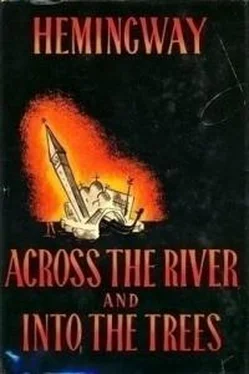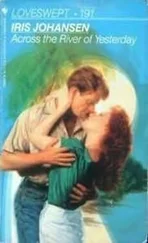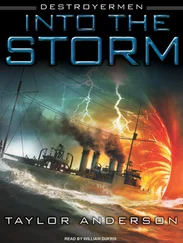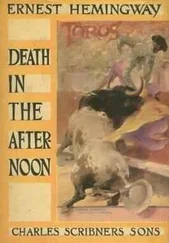'As you wish, my Colonel.'
The waiter opened the windows and the north wind came into the room.
'Please call the desk and ask them to ring this number.' The waiter made the call while the Colonel was in the bathroom.
'The Contessa is not at home, my Colonel,' he said. 'They believe you might find her at Harry's.'
'You find everything on earth at Harry's.'
'Yes, my Colonel. Except, possibly, happiness.'
'I'll damn well find happiness, too,' the Colonel assured him. 'Happiness, as you know, is a movable feast.'
'I am aware of that,' the waiter said. 'I have brought Campari bitters and a bottle of Gordon Gin. May I make you a Campari with gin and soda?'
'You're a good boy,' the Colonel said. 'Where did you bring them from. The bar?'
'No. I bought them while you were away so that you would not have to spend money at the bar. The bar is very costly.'
'I agree,' the Colonel agreed. 'But you should not use your own money on such a project.'
'I took a chance. We have both taken many. The gin was 3200 lire and is legitimate. The Campari was 800.'
'You're a very good boy,' the Colonel told him. 'How were the ducks?'
'My wife still speaks of them. We had never had wild ducks, since they are of such expense, and outside of our way of life. But one of our neighbours told her how to prepare them and these same neighbours ate them with us. I never knew that anything could be so wonderful to eat. When your teeth close on the small slice of meat it is an almost unbelievable delight.'
'I think so, too. There is nothing lovelier to eat than those fat iron–curtain ducks. You know their fly–way is through the great grain fields of the Danube. This is a splinter flight we have here, but they always come the same way since before there were shot–guns.'
'I know nothing about shooting for sport,' the waiter said. 'We were too poor.'
'But many people without money shoot in the Veneto.'
'Yes. Of course. One hears them shoot all night. But we were poorer than that. We were poorer than you can know, my Colonel.'
'I think I can know.'
'Perhaps,' the waiter said. 'My wife also saved all the feathers and she asked me to thank you.'
'If we have any luck the day after to–morrow, we'll get plenty. The big ducks with the green heads. Tell your wife, with luck, there will be good eating ducks, fat as pigs with what they have eaten from the Russians and with beautiful feathers.'
'How do you feel about the Russians, if it is not indiscreet to ask, my Colonel?'
'They are our potential enemy. So, as a soldier, I am prepared to fight them. But I like them very much and I have never known finer people nor people more as we are.'
'I have never had the good fortune to know them.'
'You will, boy. You will. Unless the Honourable Pacciardi stops them on the line of the Piave, which is a river which no longer contains water. It has been siphoned off for hydro–electric projects. Perhaps the Honorable Pacciardi will fight there. But I do not think he will fight for long.'
'I do not know the Honourable Pacciardi.'
'I know him,' said the Colonel.
'Now ask them to ring Harry's and see if the Contessa is there. If not, have them ring the house again.'
The Colonel took the drink Arnaldo, the glass–eyed waiter, made him. He did not want it and he knew that it was bad for him.
But he took it with his old wild–boar truculence, as he had taken everything all of his life and he moved, still cat–like when he moved, although it was an old cat now, over to the open window and looked out on the great Canal which was now becoming as grey as though Degas had painted it on one of his greyest days.
'Thanks very much for the drink,' the Colonel said and Arnaldo, who was talking into the telephone, nodded and smiled his glass–eyed smile.
I wish he did not have to have that glass eye, the Colonel thought. He only loved people, he thought, who had fought or been mutilated.
Other people were fine and you liked them and were good friends; but you only felt true tenderness and love for those who had been there and had received the castigation that everyone receives who goes there long enough.
So I'm a sucker for cripes, he thought, drinking the unwanted drink. And any son of a bitch who has been hit solidly, as every man will be if he stays, then I love him.
Yes, his other, good side said. You love them.
I'd rather not love anyone, the Colonel thought. I'd rather have fun.
And fun, his good side said to him, you have no fun when you do not love.
All right. I love more than any son of the great bitch alive, the Colonel said, but not aloud.
Aloud, he said, 'Where are you getting on that call, Arnaldo?'
'Cipriani has not come in,' the waiter said. 'They are expecting him at any moment and I am keeping the line open in case he arrives.'
'A costly procedure,' the Colonel said. 'Get me a reading on who's there so we don't waste time. I want to know exactly who is there.'
Arnaldo spoke guardedly into the mouthpiece of the telephone.
He covered the mouth of the phone with his hand and said, 'I am talking to Ettore. He says the Barone Alvarito is not there. The Count Andrea is there and he is rather drunk, Ettore says, but not too drunk for you to have fun together. The group of ladies that comes in each afternoon are there and there is a Greek princess, that you know and several people that you do not know. Riff–raff from the American Consulate who have stayed on since noon.'
'Tell him to call back when the riff–raff goes and I'll come over.'
Arnaldo spoke into the phone, then turned to the Colonel who was looking out of the window at the Dome of the Dogana, 'Ettore says he will try to move them, but he is afraid Cipriani will not like it.'
'Tell him not to move them. They don't have to work this afternoon and there is no reason why they should not get drunk like any other man. I just don't want to see them.'
'Ettore says he will call back. He told me to tell you he thinks the position will fall of its own weight.'
'Thank him for calling,' the Colonel said.
He watched a gondola working up the Canal against the wind and thought, not with Americans drinking. I know they are bored. In this town, too. They are bored in this town. I know the place is cold and their wages are inadequate and what fuel costs. I admire their wives, for the valiant efforts they make to transport Keokuk to Venice, and their children already speak Italian like little Venetians. But no snapshots to–day, Jack. To–day we are giving the snapshots, the bar–room confidences, the unwanted comradely drinks and the tedious woes of the Consular services a miss.
'No second, third or fourth vice–consuls to–day, Arnaldo.'
'There are some very pleasant people from the Consulate.'
'Yeah,' the Colonel said. 'They had a hell of a nice consul here in 1918. Everybody liked him. I'll try to remember his name.'
'You go back a long way back, my Colonel.'
'I go back so damn far back that it isn't funny.'
'Do you remember everything from the old days?'
'Everything,' the Colonel said. 'Carroll was the man's name.'
'I have heard of him.'
'You weren't born then.'
'Do you think it is necessary to have been born at the time to know about things that have happened in this town, my Colonel?'
'You're perfectly correct. Tell me, does everybody always know about everything that happens in this town?'
'Not everybody. But nearly everybody,' the waiter said. 'After all, sheets are sheets and someone has to change them and someone has to wash them. Naturally I do not refer to the sheets in a hotel such as this.'
'I've had some damn good times in my life without sheets.'
'Naturally. But the gondoliers, while they are the most co–operative and, for me, the finest people that we have, speak among themselves.'
Читать дальше
Конец ознакомительного отрывка
Купить книгу












